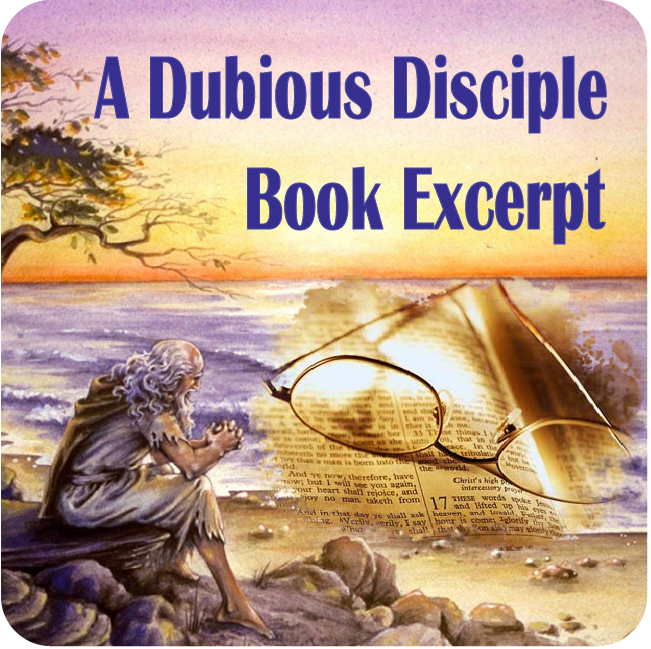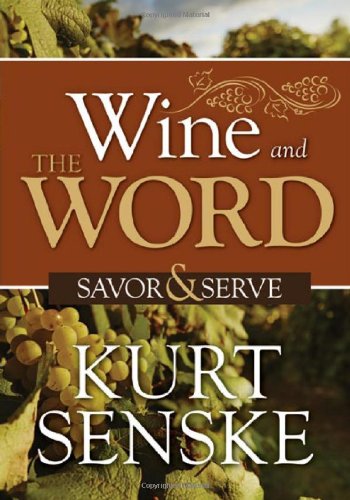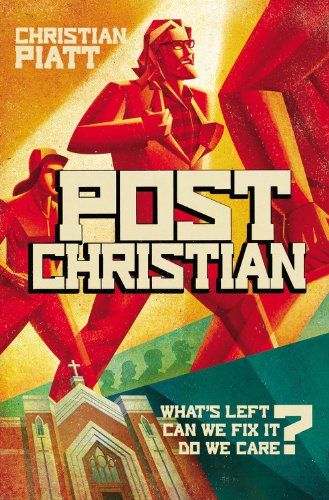Proverbs 10:15, Wealth is our Fortress
The wealth of the rich is their fortified city, but poverty is the ruin of the poor.
//It’s easy to feel this way, isn’t it? If I just had a little more money, I’d be safe and all would be well. My fortress would be impregnable. I fall into that line of thought at times, as I’m at the point in life where I’m saving frantically for my own retirement.
But a few chapters later, we find a different opinion. Note that this verse starts out identical to the first but then changes direction:
The wealth of the rich is their fortified city; they imagine it a wall too high to scale. –Proverbs 18:11
So we have a delicate balance. Wealth can provide protection, but can also be the source of pride, leading to downfall.
Luckily, wealth is something I’ll never have to worry about.

Book Excerpt: Revelation: The Way It Happened
To the north, outside the city, an army of wooden crosses clamored mutely for Josiah’s attention, every one of them displaying a crucified captive. Most of the victims now were dead, although some still contorted painfully with each attempt to tease air into their lungs. When the Romans needed crosses, they yanked the carcasses down and tossed them in heaps for the dogs to scavenge. Crucifixion filled the Roman need for intimidation, and now, few dared to venture outside the walls of the city to gather herbs. Josiah watched another escape attempt, a young man no older than he. He saw the Roman guards catch the man and strip him naked, then brutally whip him with thongs beaded with iron balls and sharpened bone, just large enough to tear the skin, until they bludgeoned all of the fight out of him, and his screams turned hoarse—a familiar sight. The Romans then spread the young man on a cross, driving spikes through his hands and feet. They raised the cross and dropped it into a prepared hole, steadied it in the ground, and left him there to die. Some victims died in hours, while others struggled for days, wishing for death. But all of them departed this world the way Jesus led, sharing in his agony outside the walls of God’s holy city.
Josiah’s stomach churned; he could watch no more of this suffering. He turned away from the wall and made his way back to the other side of the courtyard, minutely preferring the dismal scene inside the city. Below, starving hordes of people made civil law impossible. Uprooted from their tent sites in the north of the city, the visitors now did their best to survive in the streets of Old Town to the south, still unable to return home. Vacant eyes stared back up at Josiah, devoid of life even before death arrived. Our skin was black as an oven, because of terrible famine, the prophet Jeremiah had written. Josiah watched as a young family trudged up the stairs to the courtyard and, ignoring the Temple, stumbled instead over to the cattle pens, where the priests kept animals for sacrifice. There, they began to gather dung to eat—some put in containers to carry out; some eaten before they left the pens.
(Editor’s note: Yes, this war of 70 AD really happened and is recorded in history. This is the destruction, the gehenna (translated in many Bibles as “hell”) that Jesus warned Jerusalem about.)
–Revelation: The Way It Happened, 2010, pp. 21, by Lee Harmon

Book review: Wine and the Word
by Kurt Senske
★★★★
This little pocket-sized book was well worth the read, even for someone like me who knows nothing at all about wine.
More than anything else, the book is the expression of one connoisseur’s appreciation for the enjoyment of wine and its rich heritage. But Senske, being Christian, lifts the experience into the realm of religion. Senske finds in good wine some remarkable, unexpected metaphors.
The direction Senske went was not all what I expected. He pays only minimal homage to biblical themes such as the Lord’s Supper (the blood of Christ) and the Messianic Age (the promise of wine’s abundance in the world to come). Instead, he focuses more on inspirational comparisons of vineyards, winemaking and wine appreciation with our walk with God. You cannot finish the book without feeling an appreciation for this part of God’s creation, and thus better understand why the Bible contains so many positive references to vineyards and to wine.
Creative Communications for the Parish, © 2014, 127 pages
ISBN: 978-1-889387-76-5

2 Samuel 7:16, David’s Throne becomes God’s Throne
And thine house and thy kingdom shall be established for ever before thee: thy throne shall be established for ever.
//The four books of Samuel/Kings and the two books of Chronicles cover much the same time period and tell many of the same stories. But Chronicles was written a couple hundred years later than Samuel/Kings. It therefore sometimes portrays a little different perspective. Consider today’s verse, in which King David is promised in the book of Samuel that his dynasty (his house and kingdom) would continue forever.
Except that it didn’t. Oops! The Davidic kingdom didn’t last much longer than the date the words were written. So what to do about this promise?
The author of the Chronicles rewrites this story to emphasize not David’s kingdom but God’s kingdom, like this:
But I [God] will settle him in mine house and in my kingdom for ever: and his throne shall be established for evermore. –1 Chronicles 17:14
David’s dynasty is thus allowed to perish, while the slightly-rewritten promise remains intact.

Genesis 9:25, Canaan’s Destiny
And he said, Cursed be Canaan; a servant of servants shall he be unto his brethren.
//The Bible tells us the story of a disgruntled nation of slaves (Israel) who escape from Egypt and head to a promised land named Canaan. There, they encounter inhabitants in their way. So what do they do? They slaughter them, in a shocking genocide that apparently has God’s blessing.
Now read today’s verse. It is a precursor to the conquest, cursing Canaan. Except that it’s not cursing a nation, but a person…the father of the nation named Canaan. The descendents of this person, then, become rightfully exterminated when God is ready to move his people into the land of Canaan.
Who is Canaan the person, who cursed him, and what did he do that was so evil? He was the son of Ham, the grandson of Noah, and he did nothing wrong. One day, Noah drank a little too much and flopped down in a drunken, naked stupor in his tent, and his son Ham happened to stumble in inadvertently seeing Noah’s nakedness. So what does Noah do? Why, he curses Ham’s son Canaan forever, naturally.
It is, of course, a mythical story written to justify the invasion of Canaan after the fact.

John 20:29, Blessed are the Blind Believers
Jesus saith unto him, Thomas, because thou hast seen me, thou hast believed: blessed are they that have not seen, and yet have believed.
//This is a curious passage of scripture. John’s Gospel had just finished relaying the story of how Jesus appeared to the Twelve, materializing before them in a locked room. But once isn’t enough; the Gospel then repeats the story eight days later, with a twist. This time, the apostle Thomas is with them, who becomes a scapegoat for a lesson Jesus wants to teach. That lesson is that while Thomas believed only after seeing Jesus, true blessing comes to those who could believe without seeing the risen Jesus.
The passage is probably an add-on, not original to the Gospel, and meant to inspire readers of the Gospel after the original witnesses to Jesus’ resurrection had all passed on. Blessed are the new believers, for they are able to believe without seeing Jesus.
Of course, this contradicts the rest of the Gospel by missing the point relayed many times earlier: that believing in Jesus is how one sees him. Yes, the Thomas story surely is an add-on by a later writer, abducting John’s spiritual Gospel for his own literal resurrection beliefs. More about this in my book about John’s Gospel.

Psalm 82:6-7, The Gods Will Die Like Mortals
I said, “You are gods, And all of you are children of the Most High. But you shall die like men, And fall like one of the princes.”
//In Psalm 82, God is presiding over the heavenly council of gods. In that day, it was believed that each nation had its own ruling god. But God, capital G, asserts his authority, claiming that the other gods are mere mortals.
Switch gears now to New Testament times. In John chapter 10, the Jews are ready to stone Jesus because he claimed to be “one with God.” In reply, Jesus points to this psalm, with the following argument: God was speaking to those who would die like mortals, and calling them gods … children of the Most High. How, then, can they stone Jesus for claiming to be the Son of God, though he be mortal?
A fascinating argument that leaves my head spinning.

Book review: postChristian
by Christian Piatt
★★★★★
I’m a fan of Piatt’s books, and once again he doesn’t disappoint. I’ve reviewed a couple of books in his Banned Questions series on The Dubious Disciple, and they too are very good.
This time around, Piatt writes more personally about his past experiences and his vision for the way forward. Christianity has failed Piatt in a number of ways, but he clings to his hope for better times, redefining God (who is not a being to be named, but rather an “event” to be experienced) and looking back to Jesus for his example. He nails the spirit and teachings of Jesus as he discusses topics from neighbor envy to perfect joy. Piatt wants us to spit out the poison and examine Jesus’ example in search of a hungrier love.
In Jesus’ day, the Jews longed for a conqueror to ride in, kick ass, and take names, but instead the Messiah arrived as a Suffering Servant. A new way of thinking. But have we made any progress toward Jesus’ vision? Today, Christianity has become so inured to the values and effects of capitalism within our religious institutions that we’re effectively blind to its presence. What happened to Jesus and his dream of God’s kingdom coming to earth?
What’s left of our church? Can we fix it? Do we care? Piatt admires the church of a friend, where Republicans sit next to bleeding heart former hippies, skeptical intellectuals, and folks who have no idea what they believe, but who find they all fit together in some strangely beautiful way. They need and love one another. That, says Piatt, is a glimpse of the kingdom of God.
Moving, articulate and to the point, this is a book all Christians should read.
Jericho Books, © 2014, 214 pages
ISBN: 978-1-4555-7311-0

Acts 16:17, Libertarian Slaves?
The same followed Paul and us, and cried, saying, These men are the servants of the most high God, who show to us the way of salvation.
//Sometimes a translation can be off just enough to mask a verse’s meaning. Examine today’s verse in the book of Acts. Servants/slaves (literally, in the Greek, “bond-servants”) of the most High God appear to be going around proclaiming a way of salvation/freedom/liberation. These particular “slaves” consider themselves free men, and wish to share this libertarian view with others.
These slaves were named Paul and Silas. They were visiting Philippi when a another slave girl with a penchant for fortune-telling told on them. She said they were slaves like her, but slaves to God rather than men. Her masters were not happy that Paul and Silas were insinuating that liberty was possible for those who were slaves to God, and decided to take away Paul’s and Silas’s freedom. They cast them into prison.
Of course, it didn’t work. You know the story: Paul and Silas prayed and sang praises in prison, and an earthquake rocked the prison opening the doors. Paul and Silas were freed, but they decided not to take advantage of the situation. They stayed where they were, in prison, though the lesson behind the earthquake was clear: they were slaves to no one but God. And being a willing “bond-servant” to God is what lifted them out of bondage to anyone else.

Deuteronomy 15:4, The Poor Will Be Always With You
However, there need be no poor people among you, for in the land the LORD your God is giving you to possess as your inheritance, he will richly bless you.
//One day, a woman poured a costly ointment over Jesus’ head and/or feet, and some who were watching this extravagance balked. Couldn’t this ointment be put to better use than anointing the Messiah? Perhaps it could be sold and the money given to the poor?
Jesus replied that the poor would always be available, but that he was soon leaving the scene. It’s an odd justification, especially in light of today’s verse in Deuteronomy.
To put the Deuteronomic verse in context, it is a promise of abundance in an upcoming land of “milk and honey.” The Promised Land, as it came to be known on the journey out of Egypt to Palestine, would overflow with God’s provision, and in that place there need not be any poor.
The key phrase, of course, is “need not.” It didn’t work out that way. Israel, in their new land, quickly evolved to a monarchy that favored a few and left the multitude destitute. Such was the State of the Union by Jesus’ time … a state that seemed unfixable, for Jesus indicated that it was never going away.
Does this justify Jesus accepting a costly ointment as an anointing? What do you think?

















 354 Circles
354 Circles
 603 Goodreads Friends & Fans
603 Goodreads Friends & Fans

 Hello! I'm an author, historical Jesus scholar, book reviewer, and liberal Christian, which means I appreciate and attempt to exercise the humanitarian teachings of Jesus without getting hung up on any particular supernatural or religious beliefs.
The Bible is a magnificent book that has inspired and spiritually fed generations for thousands of years, and each new century seems to bring a deeper understanding of life’s purpose. This is true of not only Christianity; through the years, our age-old religions are slowly transforming from superstitious rituals into humanitarian philosophies. In short, we are growing up, and I am thrilled to be riding the wave.
I avidly read all thought-provoking religion titles. New authors: I'd love to read and review your book!
Hello! I'm an author, historical Jesus scholar, book reviewer, and liberal Christian, which means I appreciate and attempt to exercise the humanitarian teachings of Jesus without getting hung up on any particular supernatural or religious beliefs.
The Bible is a magnificent book that has inspired and spiritually fed generations for thousands of years, and each new century seems to bring a deeper understanding of life’s purpose. This is true of not only Christianity; through the years, our age-old religions are slowly transforming from superstitious rituals into humanitarian philosophies. In short, we are growing up, and I am thrilled to be riding the wave.
I avidly read all thought-provoking religion titles. New authors: I'd love to read and review your book!
 Hi! While Lee writes the articles and reviews the books, I edit, organize, and maintain the blog. The views expressed here are Lee's but I'm his biggest supporter! :-)
Hi! While Lee writes the articles and reviews the books, I edit, organize, and maintain the blog. The views expressed here are Lee's but I'm his biggest supporter! :-)
Connect With Me!